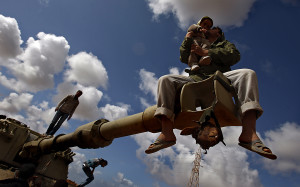Obama on Libya
 The President took the importance of America’s role as world leader and ran with it—as well he should have. His tone was tough and right. The speech itself was about as good as the situation would allow for, but does, nevertheless, warrant some reflection:
The President took the importance of America’s role as world leader and ran with it—as well he should have. His tone was tough and right. The speech itself was about as good as the situation would allow for, but does, nevertheless, warrant some reflection:
Questions:
-What non-military measures could conceivably drive Gaddafi from power?
-If we were to make efforts at removing Gaddafi by force, would “our coalition” actually “splinter”? Put differently, did anyone find their way into this whole ordeal expecting that we might ultimately do something other than see to it that Gaddafi was removed? Did they think this could be done by ways other than force? No and no, I’d suspect…
-Is having gone down a given “road” in Iraq sufficient rationale for not doing it now? Given that Iraq and Libya are two rather different places, it would make relatively little sense to apply the same logic to both… this makes little sense in strategic terms, and, one hopes, that Obama’s audience wouldn’t let it effect their political impressions of the situation either.
-Did “regime change” really take 8 years in Iraq? Of course not. The institutional process of “regime change” can happen quite quickly. Nation building, however, is another beast entirely—and, as our experience in Iraq has shown, it may take a good while. So is the implication that if we don’t off Mr. Gaddafi, we wont ultimately be left to rebuild to the country he has destroyed? Were one to imply such a thing, he or she would be silly to do so… A post-Gaddafi Libya stands to be a fairly frightening place; and it’s a place that will play host to a set of processes in which we will no doubt choose to be involved… and this will be true regardless of how Gaddafi finds his way out of the picture…
-More broadly, what’s the end game here? Mr. Obama’s speech shed light on a number of things, I’m not sure, though, that this was among them…
-What happens if Bashar Al-Assad lets loose on folks in Damascus or Daraa? Will our support for universal human rights draw us into armed engagement there? There’s a pretty real sense in which Gaddafi and, more broadly, Libya are easy targets. We, the American people, know nothing about the country other than that we dislike its leader. Even relative to other regimes in the region, Gaddafi has virtually no military or security apparatus at his disposal. The terrain in Libya isn’t all that tough—at least not when compared to, say, Yemen. If, collectively, “we” come up short, we’ll have a humanitarian issue on our hands; but nothing more. There’s no creeping Iran in Libya. Al-Qaeda’s stronghold is elsewhere. There’s oil at stake, but not that much. Israel’s a pretty good ways away… Did Obama speak to the possibilities posed by similar sorts of hypothetical conflicts in Syria, Yemen, Bahrain and elsewhere?… I didn’t really think so…
Thoughts:
Obama’s an obviously capable speaker, but this was a tough, tough speech. There’s really no win here. Politically, the issue in Libya is quite probably without a solution: We had to intervene; but, at the same time, couldn’t do so in a way that looked as if it lent itself to being prolonged. We had to stop the killing, but couldn’t commit ourselves to stopping the killer. From the beginning, Mr. Obama’s hands were tied.
So in approaching the PR campaign that inevitably came part and parcel with the military one, a couple of things should have been born in mind:
- How do we pull this off without altering regime incentive structures across the region? More specifically, how do we reconcile the obvious tension between, on the one hand, needing to show that Gaddafi is bad enough to warrant this sort of response; and, on the other hand, not wanting to convince the Bashar Al-Assads of the world that they can get away with a lot before being put in the “Gaddafi category.” This is no easy task, and, again, may well not have ever been possible.
- How do we make it seem as this is not a one time gig? How do we convince folks both here and abroad that, if duty calls, we’ll go at it again in, say, Yemen?
- If you’re Obama, how do you sell the idea that protecting civilians and finding non-military solutions to the still-present Gaddafi problem is going to get the job done? For obvious reasons, the notion of “regime change” will be an anathema to any and all politicians for the foreseeable future… but, in PR terms, what does one do if he or she is indeed out for regime change? In this particular instance, failing to facilitate the end of Gaddafi’s reign is only going to draw out a set of very long and, presumably, very tough processes. In his heart of hearts, Obama seems to fully embrace the notion that anything other than a Gaddafi-free-Libya wont cut it. But, again, how does he go about selling this?
-Ideas of consistency and precedence seem almost entirely worthless in this conversation. It doesn’t appear to be the case that these types of situations ever replicate themselves perfectly; and, thus, it seems as if we would be remiss to limit ourselves to a rigid policy paradigm in response.